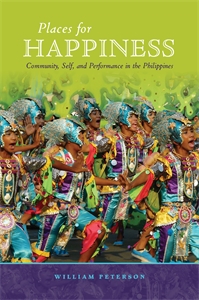Places for Happiness: Community, Self, and Performance in the Philippines
Awards
- Winner of the ADSA Rob Jordan Prize, 2018
- About the Book
-
Places for Happiness explores two of the most important performance-based activities in the Philippines: the processions and Passion Plays associated with Easter and the mass-dance phenomenon known as “street dancing.” The scale of these handcrafted performances in terms of duration, time commitment, and productive labor marks the Philippines as one of the world’s most significant and undervalued performance-centered cultures. Drawing on a decade of fieldwork, William Peterson examines how people come together in the streets or on temporary stages, celebrating a shared sense of community and creating places for happiness.
The first half of the book focuses on localized and often highly idiosyncratic versions of the Passion of Christ. Peterson considers not only what people do in these events, but what it feels like to participate. The book’s second half provides a window into the many expressions of “street dancing.” Street dancing is inflected by localized indigenous and folk dance traditions that are reinforced at school and practiced in conjunction with religious civic festivals. Peterson identifies key frames that shape and contain the individual in the Philippines, while tracking how the local expands its expressive home by engaging in a dialogue with regional, national, and diasporic Filipino imaginaries.
Ultimately Places for Happiness explores how community-based performance responds to and fulfills basic human needs. Many Filipinos rely on family members and immediate neighbors for support and sustenance, and community-based performance assumes a unique and leading role in defining, reinforcing, and celebrating shared belief systems. By bringing forth the internal, phenomenological, and embodied aspects of a range of community-based practices contributing to human happiness, the book offers a cultural framework that interweaves the individual experience with that of the collective, plotting out what resides inside the body through the coordinates of culture.
- About the Author(s)
-
William Peterson, Author
William Peterson is a senior lecturer in drama at Flinders University in Adelaide, Australia, and former director of the Centre for Theatre and Performance at Monash University in Melbourne.
- Reviews and Endorsements
-
- Peterson’s years of fieldwork and intro- duction of Filipino anthropologists, sociologists, and historians to an English-speaking audience make this book useful to a wide range of theatre and performance studies scholars.
—The Drama Review - In Places for Happiness, Peterson centers on an investigation regarding how local psychological, political, and cultural concepts may contribute to the understanding of Philippine performance culture in its complex ontology. . . . the book is a valuable contribution not only to the disciplines of theatre and Philippine studies. Places for Happiness is also valuable for scholars, researchers, and students in other disciplines such as philosophy (especially for those who are into the phenomenology of happiness), anthropology (especially those who are specializing in anthropological linguistics), and psychology (primarily because of Peterson’s careful interrogations of the human person’s core values vis-à-vis performance).
—Asian Theatre Journal - In “emplacing” community-based ritual performances in the basic need for happiness and edification, Peterson reminds us of ethnography’s capacity to facilitate a more organic understanding of the human condition. This is a crucial contribution to scholarship on Christian ritual practices in the non-West, and a particularly timely one given Christendom’s burgeoning demographic shift to the Global South.
—Julius Bautista, Kyoto University - Places for Happiness applies performance study methodologies to contemporary Filipino theatre and dance, filling in the sociopolitical contexts. This is a story of how multivalent participation in performance as spectators, actor-dancers, and/or political satirists creates social glue in forms as varied as sinakulo passion plays, ati-atihan street festivals, youth dance spectacle-contests, and the comic political satire of Mae Paner’s “Juana Change” persona who lampoons class privilege and political corruptions. This is much needed reading for comprehending the portrait of the Filipino as artist in a contemporary context and shows the Filipino use of the arts as a space to create and display cultural identity and communitas in ways that may simultaneously be local, national, and diasporic.
—Kathy Foley, professor of theatre arts, University of California, Santa Cruz, and editor of Asian Theatre Journal
- Peterson’s years of fieldwork and intro- duction of Filipino anthropologists, sociologists, and historians to an English-speaking audience make this book useful to a wide range of theatre and performance studies scholars.
- Supporting Resources
-










